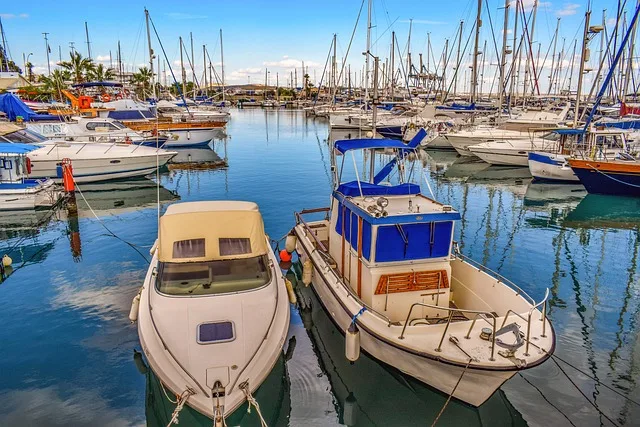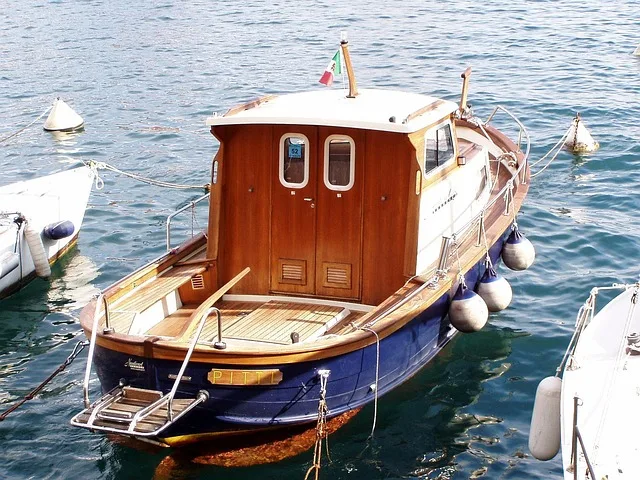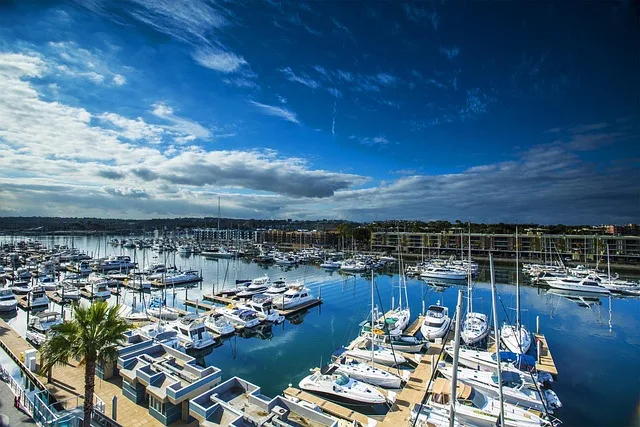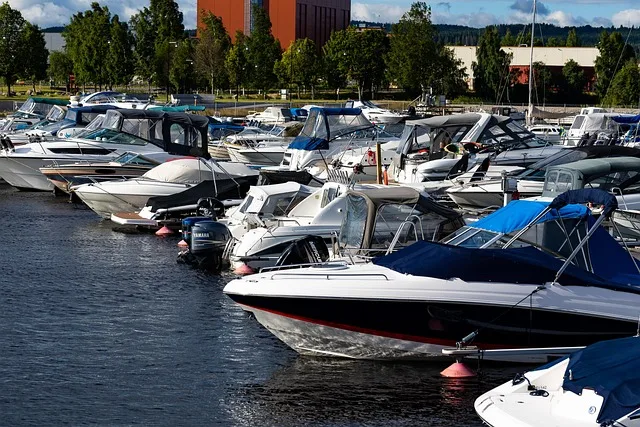Green Marine Management: Sustainable Practices for the Future
With over 62% of major cities located along coastlines and more than half of the world’s population residing in coastal areas, the economic impact of marine activities is profound. Ports, marinas, and boatyards fuel tourism, trade, fishing, and recreation, but they also generate rising levels of pollution, emissions, and waste. Green marine management creates a direct path for marinas and boatyards to reduce environmental harm while improving operational efficiency.

As environmental concerns reshape global policy and industry benchmarks, marine operators face growing pressure to modernize. Fuel leaks, unmanaged emissions, excessive paper use, and hazardous waste now draw attention from regulators, eco-conscious boaters, and investors. Traditional dock operations no longer meet these rising standards without digital support.
DockMaster acts as a digital enabler for this transformation. The platform’s web-based solution, DockMaster Web, complemented by its mobile app, DockMaster Mobile, replaces outdated manual processes with seamless digital marina management tools that support energy savings, reduce waste, and help your teams respond faster. With DockMaster Mobile, you can eliminate paper time sheets and time cards by capturing accurate, electronic time tracking data. Meanwhile, DockMaster Web provides remote access to your marina management system from anywhere, with seamless desktop synchronization and robust customer self-service capabilities to keep operations running smoothly, on or off the marina. In this article, we’ll discover how green marine management enables you to adapt to new regulations, minimize environmental impact, and operate more efficiently across global waters.
Why green marine management matters?
Traditional marina operations rely heavily on fuel-intensive equipment, paper-based processes, and manual coordination. These outdated methods cause waste, drive up emissions, and create unnecessary delays. Additionally, marinas leak hydrocarbons, idle boats burn fuel unnecessarily, and poorly managed maintenance areas allow contaminants to enter local ecosystems. Paper billing systems, paper logs, and manual scheduling only add to the waste.
These environmental risks bring growing regulatory attention. As a result, the International Maritime Organization (IMO) and the MARPOL Convention now impose stricter standards across the marine sectors. For example:
-
The IMO, through its IMO 2020 sulfur cap, mandates that the sulfur content of fuel oil used on ships globally must not exceed 0.5%.
-
Under MARPOL, ships are required to adhere to comprehensive regulations concerning the stowage, handling, transport, and transfer of pollutant cargoes, along with strict guidelines for the discharge of operational waste generated onboard. The convention is structured into six distinct Annexes, each addressing a specific type of marine pollution. While Annexes I and II (dealing with oil and noxious liquid substances in bulk) are mandatory for all signatory nations, Annexes III through VI, which cover harmful substances in packaged form, sewage, garbage, and air pollution, respectively, remain optional.
If you ignore these evolving requirements, you risk penalties, reputational damage, and lost revenue. For instance, in 2021, Diana Wilhelmsen Management Limited (DWM) pleaded guilty to two felony violations of the Act to Prevent Pollution from Ships (APPS). The company’s vessel, M/V Protefs, illegally discharged oily bilge water overboard between April and June 2020. The crew failed to report the discharges in the Oil Record Book, violating APPS regulations.

DWM was fined $2 million, placed on probation, and ordered to implement an Environmental Compliance Plan. The ship’s chief engineer was fined $3,000 and sentenced to probation. Whistleblowers from the crew received $450,000 for aiding the investigation.
However, compliance does not have to feel like a burden. Digital marina management can help you meet legal standards while improving speed, accuracy, and customer satisfaction.
Customers now look for eco-friendly marina operations when choosing service providers. Owners want to dock at clean, efficient marinas that respect the environment. When you adopt sustainable practices, you gain their trust, reduce operational waste, and cut costs over time. Digital systems help you make those changes without disruption.
Sustainable practices empowered by digital tools
You don't need to start from scratch. You only need to replace legacy habits with modern tools. DockMaster helps you do that with targeted features built specifically for marinas and boatyards. Let’s take a look at them.
1. Paperless operations
Technology has transformed how you manage marine operations, but one shift is still lagging: the move away from paper.
Manual processes still slow you down, create room for error, and force repetitive data entry. Paper documents go missing, cost money to store, and leave your business vulnerable to loss or damage. Going paperless solves those problems while helping you adopt eco-friendly marina operations. Digital marina management removes paper from daily tasks and reduces your environmental footprint at the same time.
With DockMaster, you can process reservations, billing, work orders, and maintenance entirely within the system. That means no more lost forms, slow sign-offs, or time-consuming filing. DockMaster’s marina management software further helps you:
-
Speed up check-ins and reservations with a digital interface instead of clipboards
-
Handle invoicing, billing, and payment tracking in one secure, electronic system
-
Keep detailed maintenance records and asset logs without physical binders
-
Instantly access data from a centralized dashboard—no re-entry, no duplicate copies
DockMaster also simplifies service operations across your marina by converting estimates into work orders using predefined templates and avoiding any double data entry. Every update syncs with the central system, so you remove delays and eliminate any need for paper forms. Your technicians track labor hours using the DockMaster Mobile App’s time clock, then attach photos and comments from their phones or tablets. All information flows directly into DockMaster in real time, so you maintain full visibility without chasing physical records.
When you depended on paper, every misfiled or missing document created risks. You lost business information with no backup or recovery. DockMaster’s Financial Management system supports accounting across all departments and feeds entries into the General Ledger with full audit trails. You don’t have to rely on file cabinets or hard copies anymore, and your data remains secure at all times.
2. Energy efficiency
One of the most persistent inefficiencies marinas face is poor slip allocation, which leads to wasted resources and unnecessary fuel use. When customers circle the marina looking for space, they burn fuel, increase emissions, and lose patience. At the same time, you lose opportunities to operate at full capacity and run your property efficiently.
DockMaster helps you prevent those losses through precise scheduling, smart resource allocation, and real-time visibility into slip availability. The Reservations Management system handles both wet slips and dry stack scheduling, while the LaunchMaster® module simplifies launch requests and haul-outs with complete tracking. You can manage transient slips, track deposits, and maintain accurate waitlists—all without paper logs or disjointed systems.
Plus, the Visual Marina lets you locate and assign space without guesswork. You also manage expected arrivals and departures with better accuracy, reducing fuel use caused by unnecessary vessel movements. Your staff no longer needs to rely on back-and-forth radio calls or last-minute adjustments to organize dock space. DockMaster’s integrated tools help you assign slips faster, avoid double-booking, and reduce idle boat time.

3. Smart inventory
Overstocking leads to expired materials, wasted resources, and unnecessary shipments. Similarly, understocking delays jobs and frustrates customers. You can avoid both problems with an integrated system that tracks your inventory accurately and gives you complete operational visibility.
You manage parts and fuel inventory from ordering to usage using DockMaster’s digital workflows and centralized controls. The platform supports purchase order creation, special order tracking, and accounts payable integration, so you eliminate disconnected processes. You define minimum and maximum stock levels and automate reorders to prevent shortages and emergency shipments.
DockMaster’s inventory management tools help you track detailed part specifications across jobs and locations. You avoid using incorrect materials or duplicating orders, even during busy service periods. With every transaction logged digitally, you eliminate paper forms, reduce shrinkage, and save on labor costs linked to manual checks.
With its real-time reporting tools, you can access low-stock alerts, inventory valuation, order status updates, and stock movement trends. These insights help you make timely, informed purchasing decisions and reduce excess inventory that would otherwise expire or go unused. DockMaster also supports built-in labeling and barcode generation to speed up warehouse activity and improve traceability.
When you manage inventory digitally, you limit waste, reduce shipping frequency, and use every resource more efficiently. That control supports marine inventory sustainability and directly cuts your environmental impact without compromising your operational performance.
4. Mobile workforce
You don’t need technicians wasting time chasing paperwork or returning to the office between jobs. The DockMaster Mobile app puts every task, update, and tool directly into their hands, so they work faster and smarter on-site.
Technicians can update work orders from their phones or tablets and sync photos, comments, and job changes instantly with DockMaster. You keep all job information in one place, visible to both field and office staff without extra communication. They can start and stop labor timers or log hours manually, cutting billing errors and removing the guesswork from time tracking. If they lose signal, DockMaster Mobile continues operating in offline mode and automatically syncs once reconnected.
This way, you can remove unnecessary trips and prevent delays caused by lost forms, missing data, or unclear instructions. Jobs move faster, paperwork disappears, and both office staff and field techs stay fully connected.
5. Digital payments
Your billing process impacts your environmental footprint. When you rely on paper invoices, mailed checks, or printed receipts, you create avoidable waste and slow down your cash flow. DockMaster replaces these outdated methods with digital payment systems.
DockMaster Payments, powered by ValPay, links every transaction across your marina, from work orders to part sales and dockage fees. You eliminate paper-based processing while unifying payments under a single, secure system that supports real-time tracking and audit reliability.
Because everything connects directly within DockMaster, staff avoid entering payment details manually or using disconnected tools that introduce errors. Each transaction, whether for a service, reservation, or POS purchase, flows through the same system without duplication or paperwork. Customers pay online through credit card or ACH, using secure links sent directly with reservation or estimate documents. That eliminates the need for physical contracts or in-person payment, while improving customer convenience and shortening payment cycles.
DockMaster Payments stores all transaction data within a PCI-compliant platform, reducing the risk of paper-based theft, fraud, or lost records. You keep sensitive data secure, eliminate filing cabinets, and reduce the volume of printed payment forms or receipts. Your business gains next-day funding, giving you access to settled payment batches within 24 hours. That speed strengthens your cash flow and supports better planning around parts ordering, staffing, and operations without financial delays.
Real-world green outcomes with DockMaster
DockMaster helps you reduce waste, cut emissions, and meet sustainability goals without sacrificing speed, control, or customer service. Every function, from billing to parts tracking, replaces a manual task that once relied on paper, fuel, or human guesswork. You eliminate those inefficiencies while building smarter systems that support clean, eco-friendly marina operations.
Digital billing replaces printed invoices, mailed receipts, and physical checks that generate paper waste and delay your payment cycle. You collect funds faster, access records instantly, and lower the costs tied to printing, shipping, and document storage. That change not only saves money but also shrinks your environmental footprint across billing operations.
Your technicians no longer run back to the office for job sheets or updates when they use the DockWorks App. They receive tasks instantly, log time on-site, and upload photos and notes without writing anything down. Each completed task means fewer wasted steps, reduced fuel use, and no printed documents to file or store.
DockMaster reduces emissions by helping you plan jobs better, move smarter, and finish work with fewer delays or repeats. Your team avoids idling equipment, unnecessary trips, and wasted hours caused by unclear instructions or missing paperwork. As those patterns shift, your operations become more precise, productive, and environmentally responsible.
Inventory management also plays a major role in your sustainability efforts, especially when you stop over-ordering or rushing last-minute purchases. With DockMaster, you track stock levels live and order based on actual usage instead of static schedules. That means less waste, fewer expired items, and minimal fuel spent on emergency shipments.
You set reorder thresholds, follow part movement across jobs, and avoid duplication using centralized digital records your whole team can access. Each part you track more accurately becomes one less item lost, scrapped, or needlessly restocked. That control helps you reduce material waste and shrink your overall environmental impact.
Getting started with a greener marina
Starting your marina’s green transformation is easier than it sounds. Here’s how you can begin:
-
Assess your current operations: Start by identifying areas where you waste resources, like energy, water, or paper. Look for improvements in daily operations that align with sustainable marine practices
-
Leverage integrated tools: A unified product suite like DockMaster’s, combining its robust hosted platform with powerful web-based and mobile solutions, streamlines operations and centralizes critical tasks. Automating processes like reservations, billing, and maintenance tracking not only cuts waste but also saves valuable time, helping you manage your marina more efficiently
-
Adopt green boating technology: Provide boaters with electric charging stations or eco-friendly fuel options to reduce emissions and make your marina stand out as a green destination
-
Incorporate renewable energy: Renewable energy ports, like those with solar or wind power, reduce reliance on non-renewable resources and lower your energy costs over time. Not only do you make your marina more eco-friendly, but you also make it more sustainable
-
Reduce waste: On the waste front, small changes can make a huge impact. Encouraging marina waste reduction through better waste management practices, recycling programs, and educating your staff and customers can reduce waste and ensure a cleaner marina environment
Building a greener marina requires a shift in mindset. Focus on implementing sustainable marine practices while adopting eco-friendly technologies. As you get more comfortable with these changes, you’ll notice that sustainability becomes part of your marina’s culture, boosting your reputation as a forward-thinking, eco-conscious facility.
Embrace the future of sustainable marina management
Green marine management is the future of responsible marina operations. Ignoring fuel waste, excessive emissions, or manual inefficiencies risks your license, revenue, and reputation.
DockMaster makes it easy to adopt sustainable practices without disrupting your operations. From paperless marina systems to mobile apps, DockMaster offers practical tools that lower your environmental impact. Visual Marina™ and DockWorks help you cut waste, streamline labor, and reduce emissions. With DockMaster, you reduce energy use, simplify compliance, and appeal to eco-conscious customers. You eliminate overstocking, cut down on paper waste, and manage low-carbon dock solutions effectively.
As a marina, boatyard, or harbor manager, you're under pressure to adopt renewable energy ports and comply with regulations. DockMaster’s environmental compliance tools help you adapt before penalties or reputational damage arise.
Start digitizing, reduce waste, and build a sustainable future for your marina. Schedule a demo or consultation today to see how DockMaster can support your green transformation.
